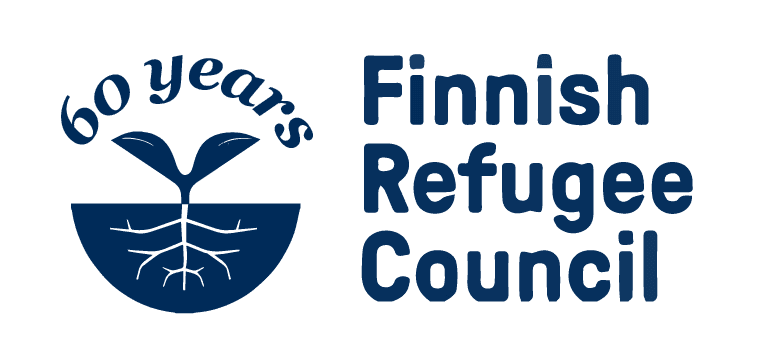Literacy alleviates the lives of refugees in a foreign country. Uganda hosts currently more than 800,000 South Sudanese refugees. When as little as one fourth of them are literate, by estimation, it is clear that there is a huge need for education.
We recently visited northern Uganda, near the South Sudanese border, to follow the progress of our adult education courses with South Sudanese refugees. The South Sudanese civil war, which has lasted for years, has driven more than 4 million people from their homes. This is equivalent to about one third of the country’s population.
The civil war and the unrest that preceded it have led to a long period of stagnation in South Sudan’s economic and social development. Only a small proportion of the population has had access to education and illiteracy is widespread. It is estimated that only one in four citizens of the country can read. The importance of education among South Sudanese refugees is immense.
As we arrived to meet the students, many study groups raised their signs of thank you, sang songs to express their gratitude, or got up to applaud. However, despite the happy reactions, one doesn’t have to look deep under the surface to see that the need for help is still huge.
The vast majority of South Sudanese arriving in Uganda are settled in the northern part of the country. Majority of the refugees in the area are completely dependent on food aid, as the local soils are difficult to cultivate, and the areas of land provided to them are small.
However, food aid is inadequate. Moreover, in the absence of other means of income, many refugees have to sell some of their food in order to buy things such as soap and essential medicines. The situation has led to serious or even critical malnutrition in refugee settlements in northern Uganda.
Ayor, 39, and Kuir, 32, who study in our adult literacy and English courses, say that they are constantly concerned about sufficient food intake and especially children’s malnutrition. Fortunately, through the Finnish Refugee Council, women learn not only how to read and write but also practical skills on how to earn their livelihoods and to improve family food security.
While malnutrition is widespread in Uganda, it is the smallest of many troubles for most South Sudanese people. UN’s report on the human rights violations in the South Sudanese civil war that was published in February describes such dreadful atrocities that escape is the only option for many.
Executions, as well as physical, mental and sexual violence, have been used in a disturbing way to ignite fear and drive people out of their homes. Refugees describe how even babies have been brutally murdered and children under the age of ten have been forced as soldiers. In some parts of the country, up to two thirds of women and one third of men are victims of sexual violence.
The warring parties of the civil war made peace last fall. Yet, as the peace process has failed many times in the past, only few refugees have so far dared to return home.
Women with families are hesitant to return to their home region, especially if they don’t know where their husbands are or whether they are even alive. This situation is very typical among refugees, with up to 80% of South Sudanese refugees being women and children.
Refugee mothers often look after the entire family alone. Women’s education levels are still below the national average. Without education and literacy, the ability to take care of their family’s well-being is worryingly low.
A mother who recently graduated from one of our courses says she mistakenly gave her daughter an almost lethal overdose of medicine because she couldn’t read the prescription.
“I almost lost my daughter. When I heard about the Finnish Refugee Council courses, I decided to work hard to learn how to read and write. Now I understand what the medicine prescriptions say and know how to dose medicine correctly.”
Literacy eases refugees’ lives in a foreign country and, as the abovementioned example demonstrates, can literally be vital. Uganda currently has more than 800,000 South Sudanese refugees. With an estimated three quarters of them illiterate, it is clear that there is a huge need for education.
Support our work
For 52 euros, we can cover the tuition of one refugee for an 11-month literacy course, including course materials, a portion of the instructor’s salary, and all other costs associated with the course. Educating one person will benefit the entire community, as those who are literate will also share and teach their skills to their children, family members, and other members of their community.
DONATE

